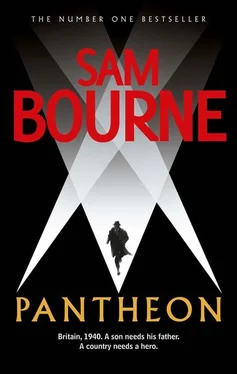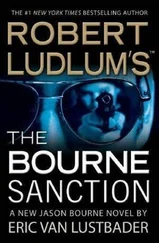Sam Bourne - Pantheon
Здесь есть возможность читать онлайн «Sam Bourne - Pantheon» — ознакомительный отрывок электронной книги совершенно бесплатно, а после прочтения отрывка купить полную версию. В некоторых случаях можно слушать аудио, скачать через торрент в формате fb2 и присутствует краткое содержание. Жанр: Триллер, на английском языке. Описание произведения, (предисловие) а так же отзывы посетителей доступны на портале библиотеки ЛибКат.
- Название:Pantheon
- Автор:
- Жанр:
- Год:неизвестен
- ISBN:нет данных
- Рейтинг книги:3 / 5. Голосов: 1
-
Избранное:Добавить в избранное
- Отзывы:
-
Ваша оценка:
- 60
- 1
- 2
- 3
- 4
- 5
Pantheon: краткое содержание, описание и аннотация
Предлагаем к чтению аннотацию, описание, краткое содержание или предисловие (зависит от того, что написал сам автор книги «Pantheon»). Если вы не нашли необходимую информацию о книге — напишите в комментариях, мы постараемся отыскать её.
Pantheon — читать онлайн ознакомительный отрывок
Ниже представлен текст книги, разбитый по страницам. Система сохранения места последней прочитанной страницы, позволяет с удобством читать онлайн бесплатно книгу «Pantheon», без необходимости каждый раз заново искать на чём Вы остановились. Поставьте закладку, и сможете в любой момент перейти на страницу, на которой закончили чтение.
Интервал:
Закладка:
Come on, come on, James thought.
He flicked through a few more pages, coming across Bertrand Russell, star philosopher and another one of the Greys’ high table chums. It seemed the great man had dreamed up a rather elaborate wheeze to improve the quality of the nation’s stock. He wanted the state to issue colour-coded ‘procreation tickets’: anyone who dared breed with holders of a different-coloured ticket would face a heavy fine. That way people of high-calibre could be sure their blood was mixed only with those of similar pedigree. Why risk contamination by those whose blood might be dangerously proletarian, foreign or weak? Just check their ticket!
James was shaking his head at the arrogance of it all when he came across an essay suggesting that the problem was not that the poor were having too many children, but that they were having the wrong kind of children. The solution was a programme of artificial insemination, aimed at impregnating working-class women with the sperm of men blessed with high IQs. There was a quotation from that queen of the Fabian Society, Beatrice Webb, explaining why her sort were worth reproducing in the greatest possible numbers, describing herself as ‘the cleverest member of one of the cleverest families in the cleverest class of the cleverest nation of the world’. Sounds just like Virginia Grey, James thought.
By the time he came to the end he was trembling with fury and loathing for these people and their contempt for anyone they deemed a lesser mortal than themselves. He pictured them all, sitting together in an Oxford college no doubt, deciding who was fit and who was unfit, who worthy and who unworthy, who shall live and who shall die. He hated them and their eugenic creed with the very core of his being.
He forced himself to focus. What had he discovered, except that Britain’s greatest progressive bigwigs were as steeped in eugenics as the luminaries of Yale? Surely this could not have been what had so agitated Lund? What had the man been trying to tell him?
James had one more flick through the collection of papers. He was looking for pencil marks, some sign, however faint, that would reveal what had caught Lund’s attention.
The funny thing was he saw it so fast he thought he had imagined it. He had to turn back through the pages slowly to pick it up again. He almost smiled to himself at the joke of it. What he was looking for was not in the text at all. It was in the footnotes — and one of James’s greatest vices as a scholar was his aversion to reading footnotes. But there it was, with the faintest pencil mark alongside it.
I am indebted to the enthusiasm and support of two scholars, whose shared interest in this subject is not only a model for further eugenic study but for future academic collaboration across the Atlantic: Prof Bernard Grey of Oxford University and Dr Preston McAndrew of Yale University.
James fell back in his seat as if he had been shoved into it. He let out no sound, but his mouth had fallen open. And then he cursed himself — for not seeing it sooner, for failing to grasp what had been in front of his nose all this time.
He was thinking of Harry. Not the little boy he knew, but the child these people, the authors of these papers, would imagine. They would see him as the offspring of two Oxford fellows, blessed with a genetic inheritance that would doubtless have placed him in the top fraction of the top one per cent in the country. He thought of Curtis and his researchers in the new field of ‘physique studies’. What would they make of Harry’s mother, with her tall, lean, flawless body that had, not long ago, made her the fastest female swimmer in the world? If physique equalled destiny then any child of Florence Walsingham was surely destined for greatness. Too bad Harry’s father had had to ruin his chances. Except that was not how these eugenicists would see it, would they? When Harry had been conceived, James had been just like Florence, an accomplished scholar-athlete, sound — better than sound — in mind and body. To the likes of McAndrew and Grey, Harry was the product of two perfect specimens of mankind.
No wonder Grey and McAndrew were collaborators. Of course they were. That was why it had been so easy for Grey to set James up at Yale, why Grey was the natural point of contact when Yale had offered to take in the Oxford children. That was surely why it had been Yale — rather than Harvard or Princeton or anywhere else in the United States — that had opened its doors to those young Britons in the first place.
James now remembered what Mrs Goodwin had said about the Dean, that he had not only been in charge of running things for the Oxford families once they had got to New Haven, he had been the driving force behind the whole scheme. James didn’t doubt that the families who had taken in little English boys and girls and their mothers had done so out of the goodness of their hearts. But now he could see that McAndrew’s motives — and Grey’s — were very different.
James digested everything he had heard at the American Eugenics Society and what he had read just now and watched the picture as it took shape in his head. What had once been a faint pencil outline was now being filled in, in blocks of solid black. Of course, of course, of course.
What were the Oxford children if not the cleverest members from the cleverest families in the cleverest class of the cleverest nation of the world? All self-respecting believers in eugenics would see it as their duty to protect such children, Harry included. If Britain was going to be bombed, if its people were soon either to be killed or to become slaves to a foreign occupier, who should be saved first? The answer was obvious, at least to all those elitist academics he had just been reading.
And not just to them. To all those people in Oxford he had brushed past or ignored, whose last names he had forgotten. Magnus Hook, wittering on about ‘superior’ social categories and ‘those we might classify as defective’ — he doubtless would have seen the matter the same way too. As would Rosemary Hyde, with her improving walks in the fresh air and the countryside, her zeal for rambling as a way of improving public health and increasing the quality of the national stock. Leonard Musgrove and those other blasted Fabians would have had the same view.
No doubt they had all conspired together in this plan to spirit the children out of Oxford, holding their secret meetings, keeping that unreliable chap Zennor in the dark, even stealing a postcard from his letterbox to ensure he didn’t find out too soon where Florence and Harry had gone and have time to stop them. They were all in on it together, with Bernard Grey in charge of the operation, colluding with his fellow eugenicist across the Atlantic, Preston McAndrew. They all believed that those one hundred and twenty-five Oxford boys and girls were the best and the brightest and had to be saved. They would be returned to England after the war, little saplings to be replanted in the soil. Even if everything — and everyone — they had left behind had turned to rubble, these saplings would take root and grow tall, blossoming into the next generation of the elite: they were the cleverest of the cleverest of the cleverest, to be preserved at all costs.
A page appeared in James’s head, popping up as if on a spring. It was the letter he had seen when he rifled through those files in McAndrew’s outer office, the letter from Cambridge declining Yale’s offer, ‘since this might be interpreted as privilege for a special class’. Cambridge had understood what James had not. Except this was not a question of mere interpretation. Given who was behind this scheme, privilege for a special class was precisely its purpose.
He wanted to run out of the library, find the nearest post office and send an urgent telegram to Grey: I know what you’ve done STOP I know how and why you did it STOP
Читать дальшеИнтервал:
Закладка:
Похожие книги на «Pantheon»
Представляем Вашему вниманию похожие книги на «Pantheon» списком для выбора. Мы отобрали схожую по названию и смыслу литературу в надежде предоставить читателям больше вариантов отыскать новые, интересные, ещё непрочитанные произведения.
Обсуждение, отзывы о книге «Pantheon» и просто собственные мнения читателей. Оставьте ваши комментарии, напишите, что Вы думаете о произведении, его смысле или главных героях. Укажите что конкретно понравилось, а что нет, и почему Вы так считаете.












